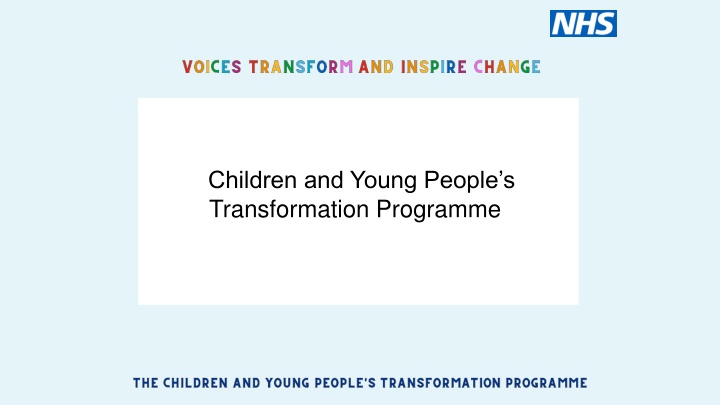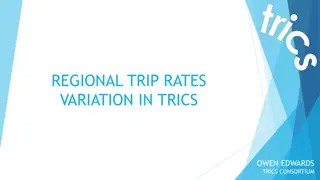
Children and Young Peoples Transformation Programme Overview
The Children and Young Peoples Transformation Programme aims to address health issues like obesity, asthma, and diabetes among children and young people in the UK. By integrating and improving services, the programme focuses on enhancing the quality of care and involving youth in policy development.
Uploaded on | 0 Views
Download Presentation

Please find below an Image/Link to download the presentation.
The content on the website is provided AS IS for your information and personal use only. It may not be sold, licensed, or shared on other websites without obtaining consent from the author. If you encounter any issues during the download, it is possible that the publisher has removed the file from their server.
You are allowed to download the files provided on this website for personal or commercial use, subject to the condition that they are used lawfully. All files are the property of their respective owners.
The content on the website is provided AS IS for your information and personal use only. It may not be sold, licensed, or shared on other websites without obtaining consent from the author.
E N D
Presentation Transcript
Children and Young Peoples Transformation Programme
The NHS Long Term Plan recognised the strong case for change to have a bespoke national programme for children and young people Obesity Asthma Hospital / ED admissions In 2016, 23% of 4-5 year olds and 34% of 10-11 year olds were overweight or obese and 4% of 10- 11 year olds had severe obesity The UK has one of the highest prevalence, emergency admission and death rates for childhood asthma in Europe, despite a slight fall in unplanned admission rates for asthma from 256 to 185 per 100,000 population between 2006/7 and 2016/17 in England In England, children and young people make up 26% of all emergency department attendances and are the most likely age-group to attend emergency inappropriately. We know around 30-50% of ED attendances could be managed in integrated care services linking primary and community care with paediatric expertise. 2.5 million children in England are overweight or obese with 1.22 million significantly obese and eligible for treatment according to NICE guidance Epilepsy Diabetes Infant mortality Epilepsy is the most common significant neurological disorder in children under the age of 19: more than one in 220 have epilepsy (approximately 63,400). 31,500 children and young people under the age of 19 have diabetes in the UK, with 95% having Type 1 diabetes. 60% of child deaths occur during the first year of life, and 70% of those are in the neonatal period (within the first month of life). Without action, UK infant mortality rates could be 140% higher than other comparable countries by 2030 Rise in obesity will result in more Type 2 diabetes in the long term The total costs of admissions attributable to paediatric epilepsy in 2016-17 was 18.4m.
There is a stark link between deprivation and child health outcomes There was a clear association between the risk of death and the level of deprivation for children who died in England between April 2019 and March 2020. This association appeared to exist for all categories of death except malignancy. On average, there was a relative 10% increase in risk of death between each decile of increasing deprivation.
The Children and Young Peoples Transformation Programme The Children and Young People s Transformation Programme was established to oversee the delivery of the children and young people s commitments in the Long Term Plan. We lead change across the health and social care system to integrate and improve services for children and young people, ensuring their voices are heard in the development of national policy. Include Integrate Improve We will include children and young people in national policy and programme development to ensure that services are designed to meet the needs of CYP. We will integrate care and services for children and young people by working with local health to develop and test integrated models of care. We will then scale proven models of care across the country. We will improve quality of care for CYP with long term conditions like asthma, epilepsy, diabetes and obesity. Develop a system to detect the deteriorating child Youth Champions and the Stakeholder Council will be central to testing policy development and delivery plans with CYP. We will work across health and social care to ensure we are keeping children well and proactively support them to live as healthily as possible. Our vision is that every child and young person in England will have equitable access to high quality health and care services which are tailored to their needs and available when they need them. These services will be joined up across health and social care settings to ensure the best outcomes are achieved, enabling every child and young person to achieve their goals and life potential. www.england.nhs.uk 4
Children and Young Peoples Transformation Programme Workstreams System-wide Paediatric Observations Tracking Programme (SPOT) To create a platform that facilitates a standardised and interoperable method of tracking and detecting the deteriorating child. This system will adapt and expand the inpatient paediatric early warning score into ED, community, ambulance and primary care, creating aligned tools, training in communication and evaluation to deliver a cross-system approach to acute deterioration in paediatrics. Urgent & Emergency Care To reduce avoidable CYP A&E attendances, identify innovative, more integrated models of care and areas of positive practice, and test the feasibility of a national paediatric NHS111 Clinical Assessment Service (CAS) and evaluate its impact on patient pathways and wider local system. Complications from Excess Weight (CEW) Clinics By 2022/23 we will treat up to a further 1,000 children a year for severe complications related to their obesity, such as diabetes, cardiovascular conditions, sleep apnoea and poor mental health. NHS Long Term Plan a strong start in life for children and young people Data & Digital To ensure that high quality, timely data is available and used on a national and local level to provide a holistic overview of children and young people s health and care and to drive improvements in their outcomes and experience. To support digital solutions and appropriate local data sharing agreements as enablers of person-centred, multi-agency, integrated care. Mental Health/Physical Health integration We will work across NHSEI to ensure that the paediatric workforce is supported when caring for children and young people presenting to hospital with acute mental health needs such as eating disorders or crisis presentations; and understand where to get additional support. Children and Young People (CYP) represent a third of our country. Their health and wellbeing will determine our future. Recent years have seen improvements in certain services which have been singled out for action, but there is a mixed picture overall. The NHS Long Term Plan (LTP) set out a vision for the future of the NHS including action to improve the health and wellbeing of children and young people. The Children and Young People Transformation Programme was established to oversee the delivery of LTP commitments in relation to children and young people. The COVID pandemic has also highlighted further areas of development which are also being taken forward by the CYP Transformation Programme. Voice To collaborate with and embed the voice of children, young people, and families across our programme of work. Long Term Conditions To prevent deaths, reduce the number admissions and to improve the quality of care and outcomes for CYP with asthma, diabetes and epilepsy. Integration Work with local health systems to co- develop what good looks like to integrate care both horizontally across health care and education; and vertically across secondary, primary and community care. Keeping Children Well We aim to work with leading health and care systems to understand how to improve outcomes for CYP by working across health, care and education where there is a shared ambition (i.e. vulnerability, speech language and communication needs) Transition By 2028, no child, young person or adolescent will be able to become lost in the gaps between children s and adults services, and that their experience of moving between services is well planned and prepared for and they feel supported and empowered to make decisions about their health and social care needs. 5 |
Children and Young Peoples Transformation Programme Structure/ Responsibilities CYP Transformation Programme Stakeholder Council Engagement with key external stakeholders Department for Education RCPCH 3rd sector & charity organisations DHSC Directors of Children's Services Engagement, strategic oversight and alignment with wider programmes of work delivering improvements for CYP and LTP commitments Dotted reporting line to the CYP Transformation Programme Board. Digital Child Health/ NHSX Learning Disabilities & Autism CYP Cancer CYP Mental Health Supporting programmes of work delivering improvements for CYP through direct funding and oversight Maternity Reports progress to the CYP Transformation Programme Board in addition to individual programme boards/governance. Special Educational Needs & Disabilities Personalised care Child Protection Information Sharing Safeguarding Policy development, implementation and oversight of core CYP Transformation workstreams. Supporting restoration and recovery of CYP services and other operational priorities. Immunisations Specialised commissioning CYP nursing workforce development Delivered by the CYPT Programme Team. Directly reports to the CYP Transformation Programme Board. SPOT, CEW clinics, LTCs, integration, transition, UEC, Keeping Children Well, data & digital, voice.
The Voice function ensures children and young people are represented in decision making and policy development. Our work is split into two key areas: Supporting regions and systems to embed the voices of children and young people Leading national youth engagement How? How? - We ve recruited six young people to sit on our CYP Transformation Board as Youth Board Members. They join every meeting, providing feedback on the work of the programme and helping set the strategic direction of children s services across England. - We re working with stakeholders on a stocktake of all current mechanisms and approaches used to embed the voices of young people, at both a regional and system level. - As of July 2022, we will run the Youth Forum, along with a delivery partner. This is made up of 25 young people from all over the country. They provide feedback, thoughts and ideas on the health issues that matter most to them. - We will use this information to develop our national support offer, identifying any gaps and potential opportunities. - We support CYP Transformation workstreams (e.g. Asthma, Diabetes) to identify opportunities for youth engagement, recruit PPV partners and help ensure CYP voices influence their work. - This year, we re establishing a Parents and Carers Network. www.england.nhs.uk 7






















